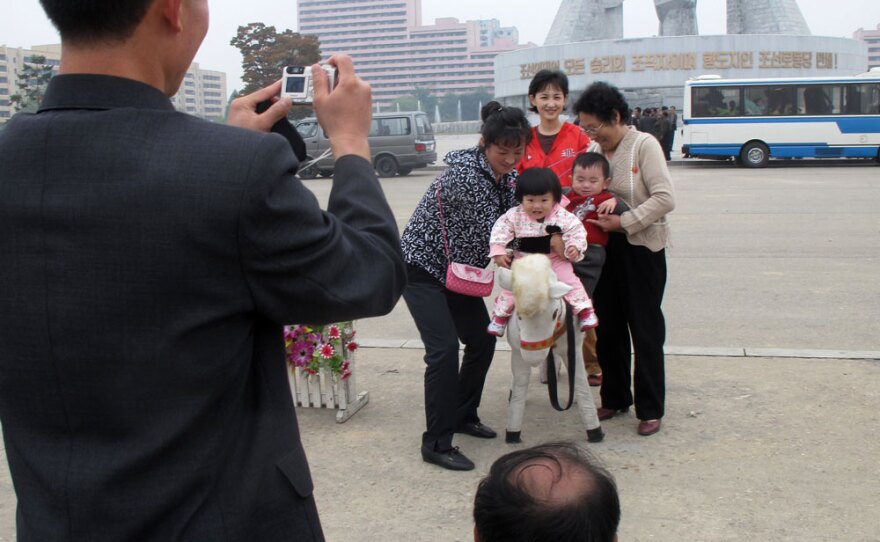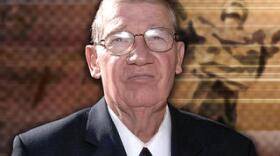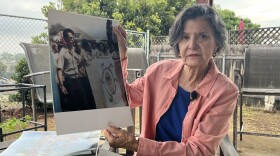NPR's Louisa Lim has just returned from Pyongyang, where she was one of a small group of foreign correspondents to cover the debut of heir apparent Kim Jong Un. In an unprecedented move, she wasn't monitored for part of the trip and was able to walk the streets, eat in local restaurants and interact with ordinary people without government handlers.
The morning light over Pyongyang is gray, as people scurry along the streets to work. Even in the center of the capital, there is almost no early morning traffic. Music is piped through the streets from loudspeakers.
This is the soundtrack to people's lives; a repertoire of about 20 rousing state-approved songs looping ad infinitum. It's yet another reminder of the state's control over everything, including the very sounds its subjects hear.
It's long been known life is unimaginably tough in North Korea. And last December, the state tried to push through currency reforms, which made it even worse.
People aren't starving, but most are constantly hungry. For almost two months after the currency re-denomination, the markets shut down, the restaurants shut down. There was simply no food available to buy, even in Pyongyang, home to the trusted and politically reliable elite. The currency reform was meant to reassert political control over the new merchant class. It failed.
Since then, the markets are back up and running, but prices have roughly doubled. A simple meal for two -- rice, a plate of kimchi and pork, and two bottles of beer -- costs 3 euros (or about $4). That may not sound like much. But at best guess, it's roughly three days' wages. And at black market rates, it would take an ordinary person a month to make enough local currency to change for 3 euros.
I say at best guess, but the truth is nobody knows. North Korea is an information black hole, comparable to Romania under the rule of dictator Nicolae Ceausescu.

Hospitals in the provinces lack medicine, anesthetics, even running water. In the capital, shops do have goods on the shelves, but not that many. In a seven-story department store, the higher the floor, the fewer the products on display. By the seventh floor, stock had apparently run out and the whole floor was closed. One young man was seen buying a single pencil, a sure sign of how tight money is.
And yet, amid this privation, there are pockets of unimaginable luxury. In the highest of the high-end stores, designer sportswear sits alongside watches costing $10,000 and Intel computers. The Egyptian telecom company Orascom boasts signing up 200,000 North Korean subscribers in less than two years. It's aiming for a million soon -- and mobile phones aren't cheap.
In posh hotels, the favored few are openly sloshing back brandy with their Chinese business partners, despite international sanctions on luxury goods. It's a sure sign that -- despite the currency reform, despite the sanctions designed to target them -- the elite is still flourishing.
Despite this glaring disparity of wealth, nobody -- not one person -- expressed any sign of dissatisfaction. Watching heir apparent Kim Jong Un appear on television, without any government minders present, a young man smiled and put his hand over his heart. At the rallies, the faithful wept with joy, to be blessed by the presence of their Dear Leader and his Young General.
This is no surprise. Discontent is growing, especially after the currency reform. But shows of dissent are punished by terms in prison camps. Voicing such thoughts to a Westerner is unthinkable. In this Potemkin city, people have learned to censor their thoughts and their faces just to survive.
Copyright 2022 NPR. To see more, visit https://www.npr.org. 9(MDAzMjM2NDYzMDEyMzc1Njk5NjAxNzY3OQ001))







